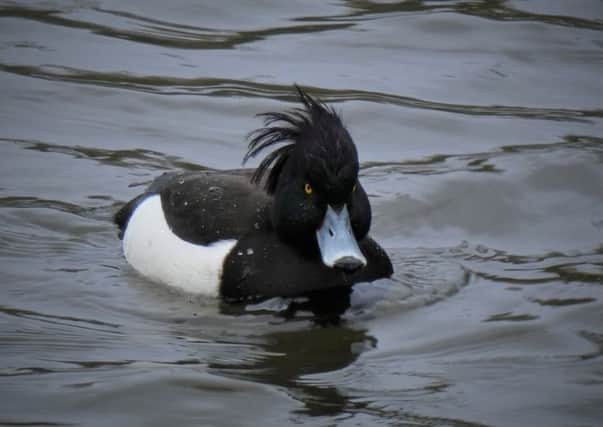The rise of the diving tufted duck


This is a ‘diving duck’ which reflects its mode of feeding as opposed to the ‘dabbling ducks’ like the mallard. Tufteds and the other diving ducks go head-first into the water and feed whilst swimming; whereas the dabblers ‘up-end’ and feed with their heads down and rear- ends up. The tufted drakes are in their most spectacular plumage at this time of year – late winter and into spring and the birds are paired up for the breeding season which is generally from late April into August. With pair-bonding and displays active from February and continuing into the summer, the birds seek out a suitable nesting location. During the summer they prefer shallower lakes or deeper ponds with water up to three metres or more, but are also found along rivers. Ideal nesting sites are close to water but in dense vegetation which provides protection from predators of both eggs and of vulnerable young birds.
The male, like with many ducks, is a real show-off with striking purple-black plumage and brilliant white flanks. The bill is silvery-blue with a black tip and the eyes bright piercing yellow. The whole display and package is topped off by a stunning jaunty tuft – hence the name. I thought the bird I pictured at Graves Park, captured the male tufted duck in all his glory, and this particular bird looks ready for a bit of aggression; no doubt all those hormones are raging with the serious business of finding and pairing with a female, of displaying and mating, and then of protecting her and the breeding territory.
Advertisement
Hide AdAdvertisement
Hide AdLook out for tufted ducks at place like Graves Park ponds and Endcliffe Park or Bingham Park, on Tyzack’s Dam at Abbeydale Hamlet, and on the major rivers such as the urban River Don, or the Wye at Bakewell, or the Derwent at Chatsworth.
Professor Ian D. Rotherham, of Sheffield Hallam University, researcher, writer and broadcaster on wildlife and environmental issues.